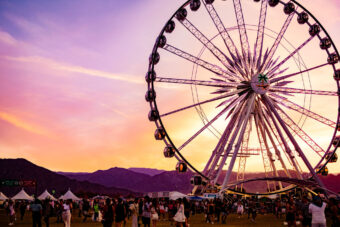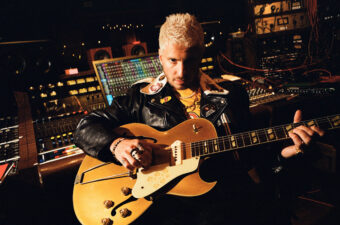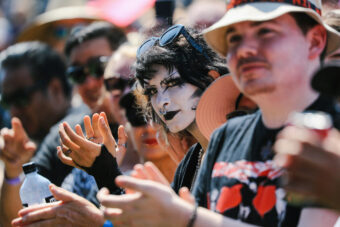This article originally appeared in the January 1989 issue of SPIN.
It's midnight, Sunday night in Dublin, and the crowds around most record stores are lining up around the block. A tramp wandering by joins the crowd, hoping to see a miracle, preferably someone who can turn water into elderberry wine.
"Are you also waiting to get a copy of the new U2 album?" one of the congregation asks.
"Agh. Them. Christ no," he grumbles, and scuttles over to the nearest alehouse.
Ah. Them. Suddenly nothing is that surprising anymore. For U2, anything is possible. The band's new album, Rattle and Hum, went double platinum in Britain on advance sales alone. Dublin record stores were forced to open at midnight on the day of its debut to avoid riots. It is now the fastest-selling album in British record history.
U2 are without a doubt the biggest band in the world. Their last album, The Joshua Tree, has now sold in excess of 14 million copies, and the group's global tour last year put them in front of over three million people, grossing over 40 million dollars. In the face of such titanic adoration, U2 should feel on top of the world. Instead, the day after, Bono looks like he's stranded on the wrong end of a bottomless pit.
"I'm going to destroy the whole fuckin' U2 myth, the U2 godhead," he says, looking half-cooked and slightly bemused. He won't do a proper interview this time around because he thinks he has nothing to say, and wants to leave the explaining to guitarist the Edge and bassist Adam Clayton. The irony is that at the moment he has lots to say, but little or no voice to say it with. Today he's in a bad way. The following day he's king of the castle again. It is typical for him to oscillate between extremes, tipping into bouts of melancholy. Being Bono for just one day would scramble most rational minds. So what's it like to be Bono all the time?
"It's very...difficult at the moment. I don't know. If I talk too long now I'll say something I'll regret." He shakes his head and adjusts his hat. "It's important that I keep things together, but it's not easy sometimes. Everything I say becomes some sort of statement, something of vast importance. I could go on stage, unzip my pants and hang my dick out and people would think it was some statement about something."
U2 are still learning to live with the conflicts they've inherited with their acclaim. Many believe Bono the awe-inspiring star can't cope with Bono the ordinary human being, which is usually a recipe for mental meltdown. In a nearby pub, the Edge and Adam sit opposite one another and muse over the singer's predicament.
[caption id="attachment_id_346011"] 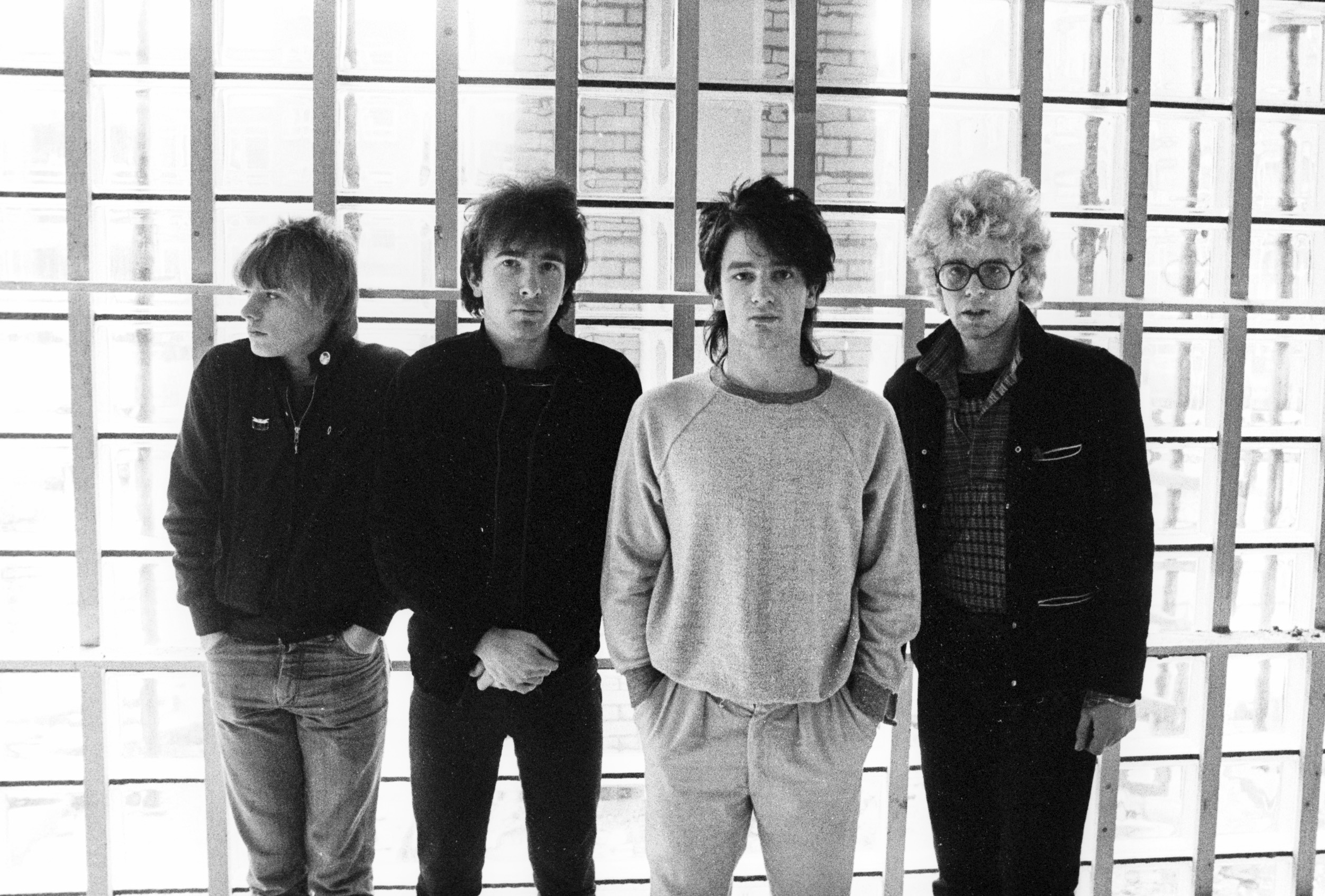 Lex van Rossen/MAI/Redferns via Getty Images[/caption]
Lex van Rossen/MAI/Redferns via Getty Images[/caption]
EDGE: "He has his moments. As a character he's a little strange. We hold together because we look after one another. If Bono gets too freaked out there's always someone there to tell him to get it together."
ADAM: "Bono can go pretty far out there. It's not as simple as sex, drugs and rock 'n' roll. You can lose your mind very easily under the pressures he's under sometimes."
For over three months last year, as the band invited a 40-member film crew along the second leg of The Joshua Tree tour through the States, U2's every waking move was captured on celluloid. Bono couldn't even relieve himself without some voice in the next cubicle shouting, "Turn over." It must have been the nearest a rock star has ever come to being a U.S. presidential candidate.
ADAM: "Oh no, no. Being a presidential candidate is the closest thing to being a rock star!"
EDGE: "We were stupid enough to agree to do the film in the first place. We only had ourselves to blame."
In fact the blame rests on manager Paul McGuinness, who understood that U2 would have had to stay on tour for almost three years to satisfy all their fans. Instead, the film Rattle and Hum offers all U2 fans the chance to sit in the back seat of a movie house and still be in the front row of the U2 stadium event, a silver screen kiss embracing the intimate and intimidating.
How did the project get started?
EDGE: "For two years we had a lot of approaches from various directors with scripts, saying, 'We could set it in Dublin and you could play a band involved in the troubles in Northern Ireland and suddenly break out...' It was absolute shit. Then it occurred to us, or rather Paul McGuinness, that maybe there was something to the idea of a film, trying to capture what the band was going through at the moment on film. Then we started to spend money—a load of money, and we thought, 'What are we going to do now?'"
https://youtu.be/z8rQ575DWD8
The film eventually cost around $5 million of the band's own money, a lot for an absent-minded excursion. The band wanted Rattle and Hum to rival their three favorite rock films: Gimme Shelter, Martin Scorsese's The Last Waltz and Jonathan Demme's Stop Making Sense. Inevitably, there's also an unintentional sprinkling of their other fave chestnut, This is Spinal Tap.
EDGE: "Gimme Shelter has got real drama because of the shooting and the Hell's Angels. That's why it's so stupid for a rock 'n' roll band to make a film. There's no drama in being on the road. The only dramatic thing was Bono breaking his shoulder. And where does that lead you? To the hospital and back again. So the fuck what?"
"At this point I'd like to say that we have no interest in acting whatsoever. In fact, we've no interest in the film business whatsoever. At least if you're a musician you can write a song, record it with someone else and it can be on a piece of plastic a week later. Making films is virtually impossible without an army of technicians and a huge budget."
[caption id="attachment_id_346014"] 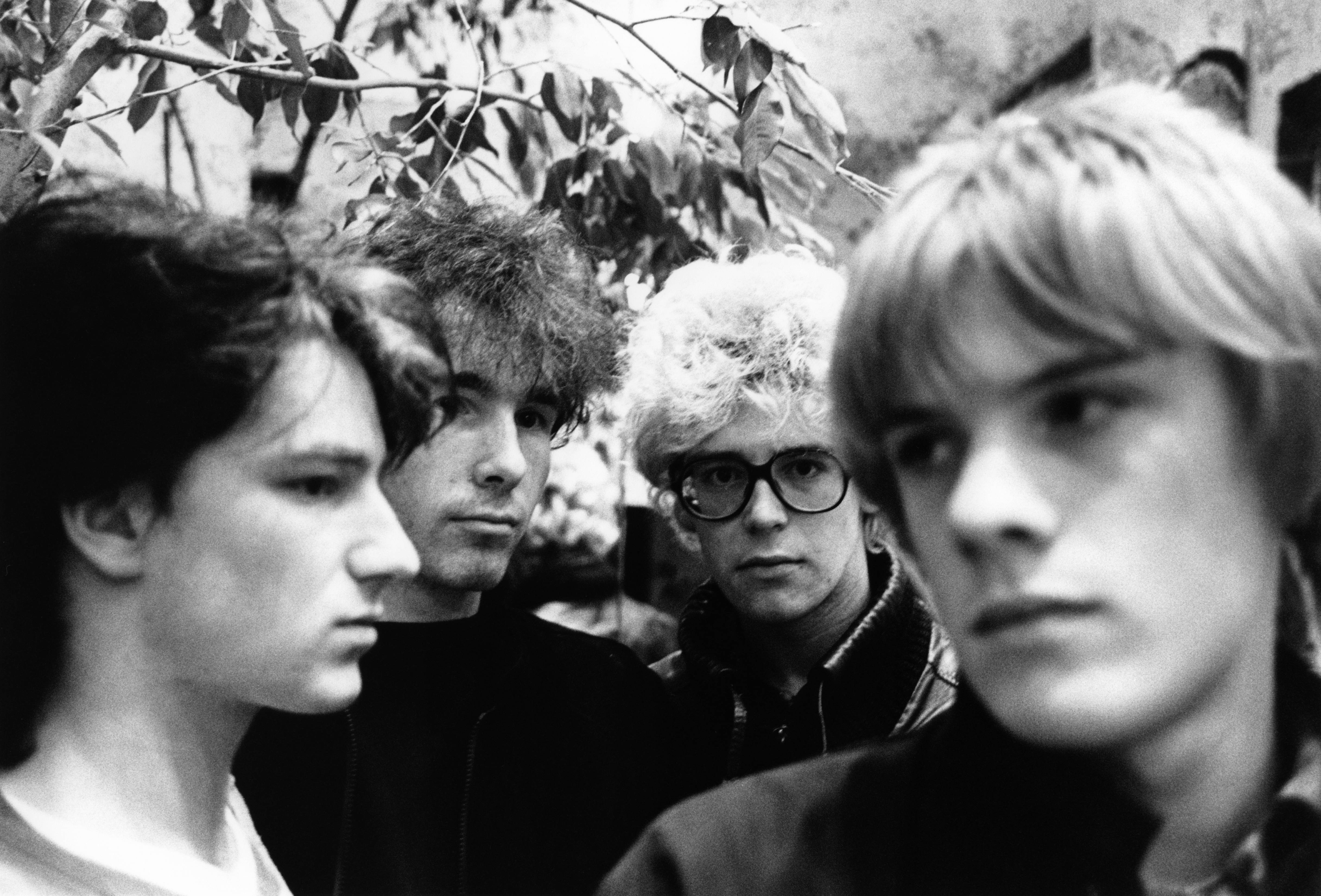 Virginia Turbett/Redferns via Getty Images[/caption]
Virginia Turbett/Redferns via Getty Images[/caption]
Director Phil Joanou filmed over a quarter of a million feet of concert film, which meant that to watch the uncut film would have taken over one week and nine hours—a little arduous for even the most ardent U2 fan. Although Joanou himself filtered off most of the dud footage, the band was still heavily involved, sifting through every frame with a final veto over the film's content. The movie shows U2 rehearsing "When Love Comes to Town" with B.B. King, watching street players in New York, working with gospel choirs in Harlem, searching through Elvis's sock drawers at Graceland and dusting off microphones in Sun Studios. But Rattle and Hum is not a rockumentary. It doesn't tell you anything about U2 you don't already know.
EDGE: "The only criteria for the film was, 'Do we find this interesting?' The holiday film aspect of things like the ambulance taking Bono to hospital after he fell off the stage was funny for a week, but it wears thin after a while. The things that sustained our interest were the musical bits. Musically it's pretty much all over the place, but it's real, it's there."
Somebody once said watching yourself on film is like watching pornography.
BONO: "I said that. It is like pornography."
EDGE: "The idea for the film was that Phil would make us all look like movie stars. The deal was that we'd all look like Montgomery Clift."
So what happened?
EDGE: "He double-crossed us, the bastard."
BONO: "They tried to film me standing still, but I kept moving about. It was ridiculous. In the end they had to keep chasing me down the street."
On camera, Bono's so fidgety and hyper he can't even act fidgety and hyper. He only appears in the film when on stage.
ADAM: "There's really little point in trying to look that good anyway. This is the year of John Cleese as sex symbol. We've no chance. We won't even get a look in."
https://youtu.be/QR07p1OtCkw
Except for drummer Larry Mullen, who steals the show.
EDGE: "That's true. He is the star of the film. Larry always had the pose. The bastard. Larry is really the Pete Best of U2. We should have thrown him out the first month. He was much too good-looking then and still is. We never found our Ringo!"
How important is this film to U2?
EDGE: "The only important thing about this film is that we've survived it. Of course, whether we survive the bullshit hype with our marbles intact remains to be seen. Having avoided a lot of the bullshit for so long, this film will mean us walking straight into a mountain of it."
Appropriately, the band have spent most of this year in Los Angeles, recording tracks for the album and weeding through the film. The last time they played in L.A. was at the Olympic stadium, where the Olympic flame was lit for only the fourth time: twice for the actual event, once for the Pope, and once for the band.
BONO: "L.A. is a strange place. As long as you think it's strange, then you're all right. I think it's strange, and I'm pretty damn strange too."
EDGE: "We don't belong anywhere, but we don't belong any less in L.A. than we do in Galway. I was living in Beverly Hills, a millionaire's suburbia, a total mindfuck, but if you go ten miles down the road you're in the middle of Watts, and you see economic apartheid in operation. If you're a black guy walking down a street in Beverly Hills, you'll get picked up in two minutes flat. There's something honest about living there. At least you're facing it.
"To write a song you have to know about people. Some of the most interesting people I met in L.A. were doormen or street bums. That's one of the great things about Bono. He really understands and is interested. No matter how big or successful he gets he'll always be fascinated...especially by women, but we won't get into that."
BONO: "I remember what you said last time: 'Bono will remain a star as long as he doesn't become a celebrity.' It's so true. Even Charlie Sheen had an imaginary conversation with me. He went on this TV show telling everyone he'd met me. He said, 'I was wasted on booze and I asked Bono, "How do you do it? How?" And Bono turned to me and pointed to the bottle and said, "You won't find it in there."' Can you believe it? It was the last date of the tour and I'd already drunk a whole bottle. I couldn't even speak, let alone preach. It's incredible. Everything gets twisted."
[caption id="attachment_id_346017"] 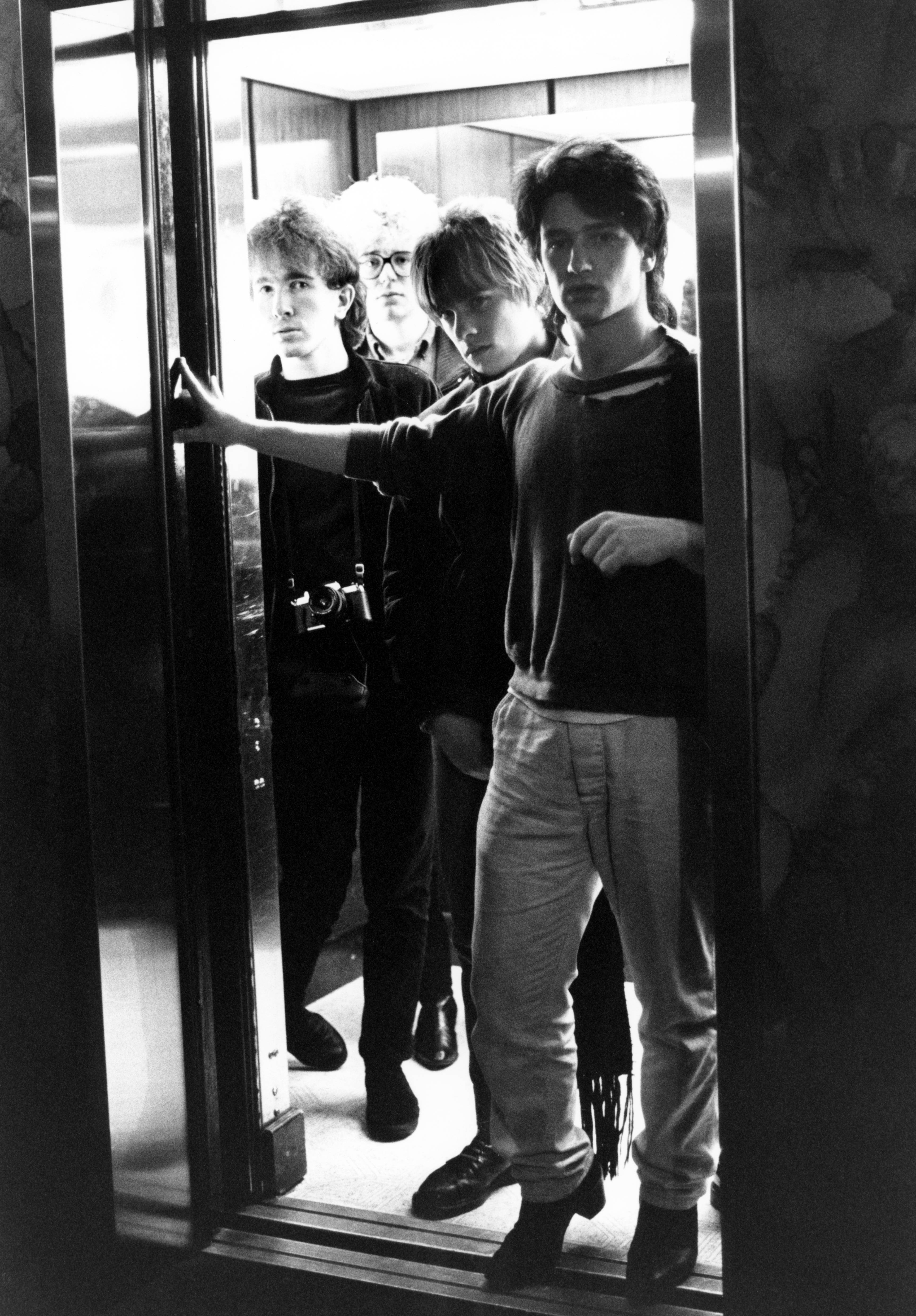 Virginia Turbett/Redferns via Getty Images[/caption]
Virginia Turbett/Redferns via Getty Images[/caption]
Since 1980, U2 have sold well over 30 million albums and have been No. 1 in almost every chart in the world. Rattle and Hum seems like a deliberate attempt to sabotage their position, to undermine the U2 myth. If The Joshua Tree was, to use Bono's phrase, "the big picture," then Rattle and Hum is a piece of spontaneous doodle, reducing their scale to more human proportions. They seem determined to exhibit their frailty, their vulnerability.
EDGE: "It wasn't really a deliberate attempt to do anything other than record the songs as straightforwardly and with as much feeling as possible. People can put a whole heap of significance on something that's incredibly straightforward and unpretentious. These are the songs we wrote and this is that album we wrote."
Five of the songs were recorded in one day at Sun Studios, and the film even shows the band screwing one of them up. Occasionally U2 can tilt the world off its axis. In this episode they couldn't even tilt a pinball machine.
ADAM: "That's what rock 'n' roll is. It's about playing the songs and not being too precious about them."
BONO: "What other band in our position would learn the chords of 'All Along the Watchtower' five minutes before they went on stage and would record it? No one."
EDGE: "You see us trying to work out what the fuck we're going to do with the songs. There's a lot of doubt around. From the beginning, most U2 songs are riddled with doubt. That's the thing about faith. Faith is meaningless without the doubt. Without doubt there is no faith."
ADAM: "You always have to ask questions. Part of the problem with music today is that people are too afraid to ask questions. Rock 'n' roll is a term that's been heavily abused. It's not something you can buy in a record shop. It's an attitude."
https://youtu.be/BpaAcIovUtk
Do you ever feel guilty about the lofty position you've attained?
EDGE: "No. I just take each day as it comes. This band is full of contradictions. The song 'God Part II' is really Bono trying to express his own internal feelings of conflict. I have doubts, but I don't feel guilty."
ADAM: "We'd feel guilty if we abused our position more, but you soon learn it's not worth it."
In "God Part II," Bono sings lines like, "I don't believe rock 'n' roll can really change the world," yet he is one of the only people who really does believe in the recuperative powers of music. He believes he can affect some small changes. Last year he told me it was this conviction that kept U2 going.
BONO: "People think, 'Oh yeah, there they are, U2 marching off to war. There goes Bono running all over the stage. And unlike Mick Jagger, Bono doesn't do it with a wink. That's the problem. Bono actually believes in the people that come to the concerts and believes in what he's doing. Oh how embarrassing. Oh dear, oh dear.'"
"I'll tell you though, Jerry Lee Lewis and Elvis Presley believed in what they were doing too. The problem in the '80s is that people stopped believing in rock 'n' roll—to believe in it has become something to scoff at."
[caption id="attachment_id_346020"] 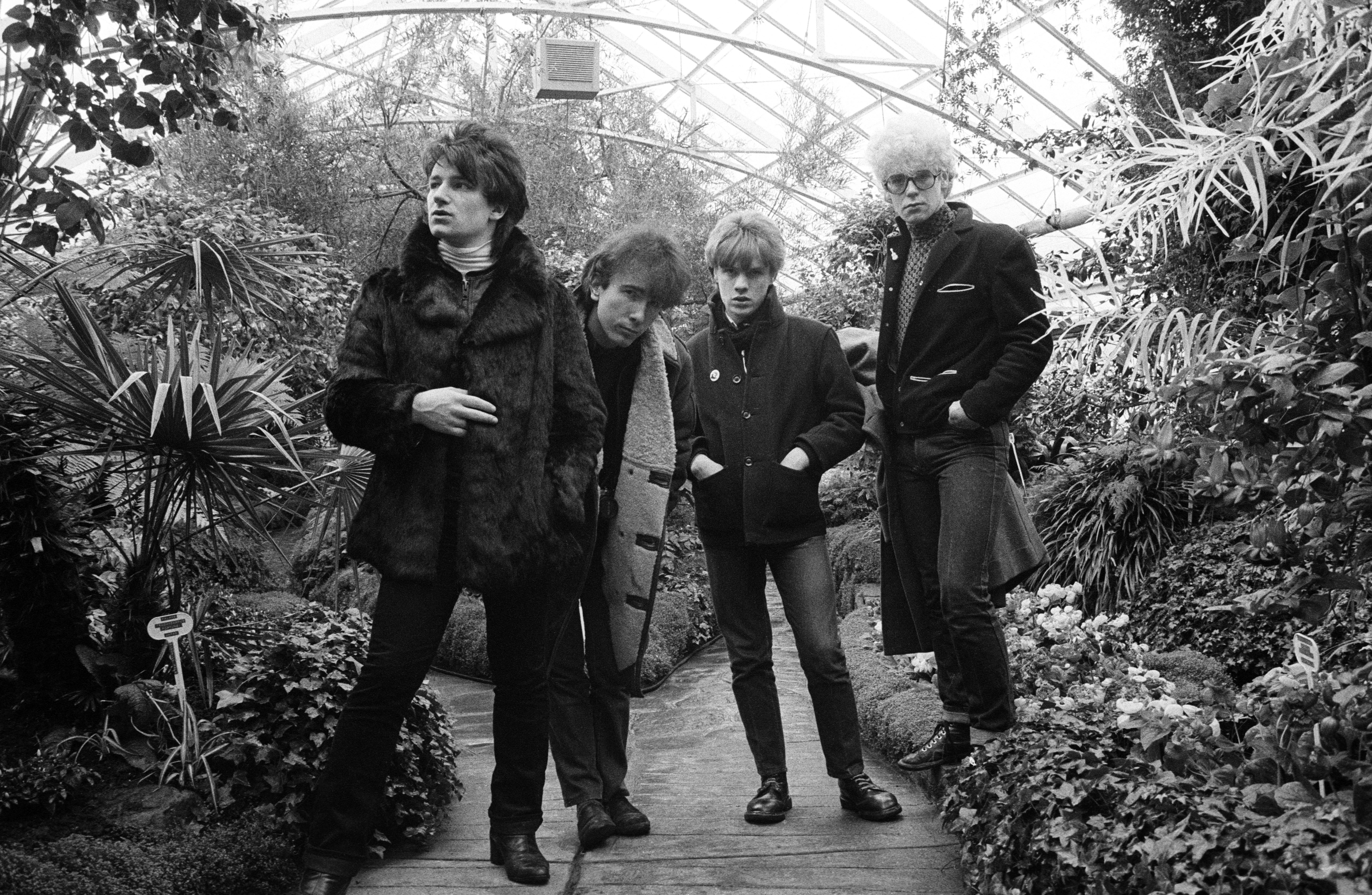 Peter Noble/Redferns via Getty Images[/caption]
Peter Noble/Redferns via Getty Images[/caption]
Although Bono's always been quick to deny any association with agitpop orators ("We don't really want to get involved—especially not in America's political playground!"), his outspoken statements and immense popularity have given him the political muscle to wrestle with issues under the arclight of public attention. Last year the band was courted by both the Kennedys and Jesse Jackson. But the star system that allows him the platform to lambaste TV evangelists in "Bullet the Blue Sky," the South African regime in "Silver and Gold," and terrorism in the film's half-acoustic version of their anthem "Sunday Bloody Sunday" (recorded a day after the tragic Enniskillen bombing in Ulster) is the very same stardom that reinforces the injustices he abhors. Idols are living proof that the system works, the dream can be attained.
No other band benefited so much from the exposure provided by Live Aid, yet U2 themselves were so unhappy with their performance, or the reasons behind it, that they almost split up. Adam pulled the band back together by demanding they record The Joshua Tree first and disintegrate later.
Are things still volatile?
The Edge laughs off the suggestion. "We split up last week, but we're back together again. I must admit that we've been getting on much better this last while. There used to be rows about everything. I think it's much easier being a big group because it allows you more freedom. It was much harder making our first few albums."
ADAM: "It is always hard, but you tend to mellow a bit as personalities. All that celebrity bullshit that you get when all you want to is play fucking music. How do you deal with that?"
How do you deal with that?
ADAM: "We drink a lot." He fingers the pint before continuing. "The only thing that gets me through the day is music. Because I know what's the truth. It doesn't matter if I'm walking down the street or riding in limos."
U2's musical isolation has been cited as the main reason they've now adopted roots in Sun Studios, Memphis.
https://youtu.be/iOA697hoop8
Why do four Irishmen now want to be Tennessee children?
ADAM: "I think the journey starts here in Dublin, with what we have in our traditional music. We hear immigration songs and songs of exploitation within Irish culture and then it went to America, going via the plantation supervisors who were Irish and then it mixed with the black blues and gospel music. That's where the journey starts. It's not adopting. It is a part of us.
"Rock 'n' roll is an American thing. It's where it all started. When you start scratching the surface of it, you go back to the lifestyles of people. When we went to Graceland to see Elvis's home it was obvious he was a simple country boy and you saw it in his house. That's really what this album is about. A return to simplicity."
Why not move forward?
ADAM: "Because who wants to play stadiums for the rest of their life? We really want to play a gig at the Marquee. That's really what it all comes down to, just enjoying playing in the band and seeing things happen when we come together. That's what's important. Not stadiums and lighting rigs zooming around the country."
The only differences between big dreams and wet dreams is the laundry bill, and from the moment Bono, Edge and Adam answered Larry Mullen's "Musicians Wanted" ad on the school notice board, U2's sole goal was to become the biggest band in the world. The rest, as they say, is hysteria. Now the biggest band in the world wants to be a garage band again.
EDGE: "That's the irony of life. There's no way around it really. It's been said that rock'n'roll died in 1959, and there's something to that. I think that the music we tend to go back to all the time is something very fragile and hard to pin down. It's in the early Elvis records, it's in some country records, in the Band. You find it in obscure bars in New Orleans and places like that. You'll never hear it on the radio. I couldn't begin to explain what exactly it is, but I know that people like T-Bone Burnett and even Dylan spent their life finding this music. We're just getting a feel for it now."
[caption id="attachment_id_346023"] 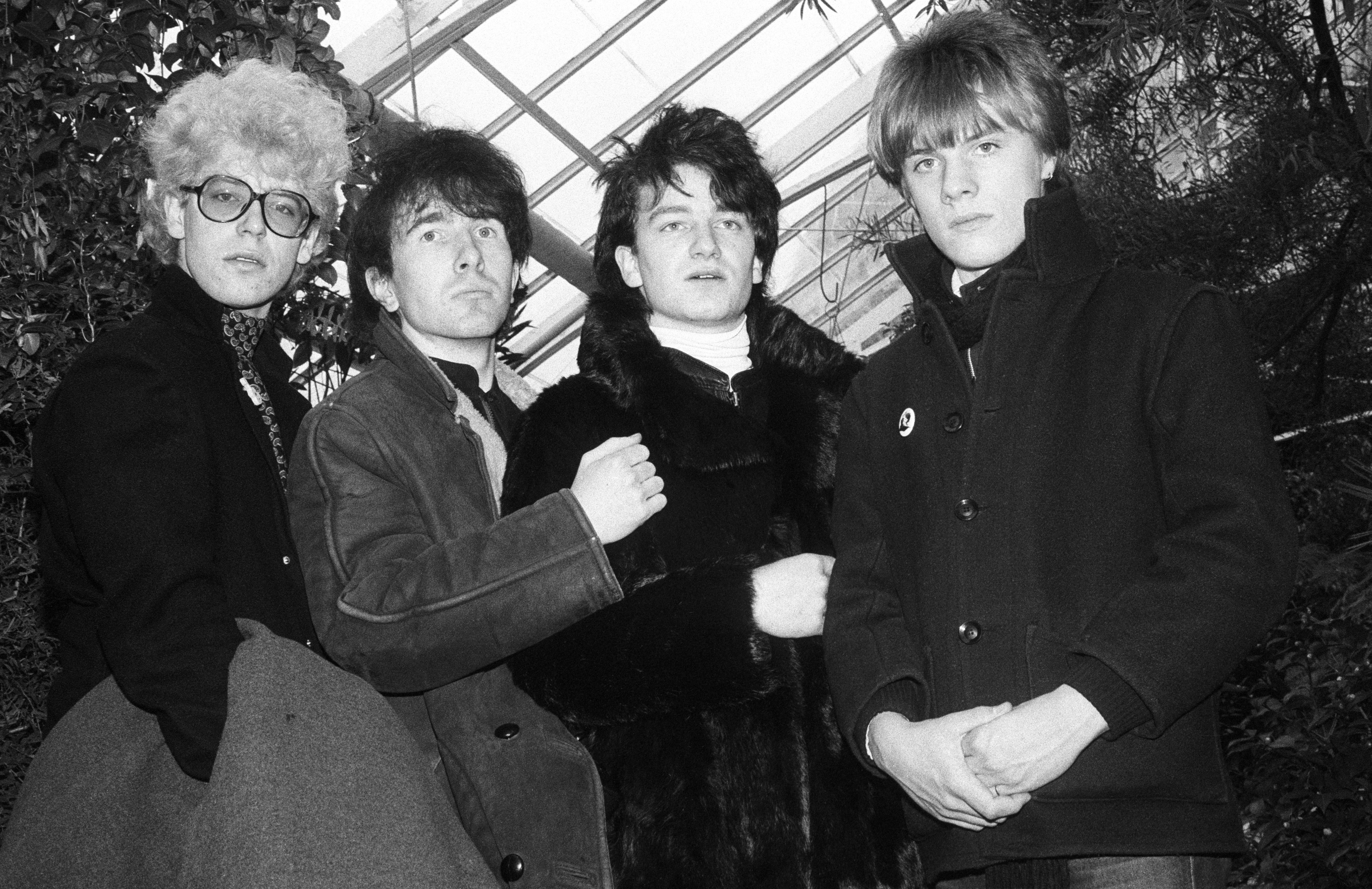 Peter Noble/Redferns via Getty Images[/caption]
Peter Noble/Redferns via Getty Images[/caption]
ADAM: "It's freedom. That's what it is."
EDGE: "Is it?"
ADAM: "Absolutely. When we were 16, we plugged in a guitar we couldn't play but it made a sound and we thought, 'We can go anywhere with this.' You have to hold on to your freedom. We're a big band now, but we could lose our freedom."
Like Prince, Marvin Gaye and Al Green, U2 have found a skein that binds sex and spirituality. Bono even describes U2's music as "soul music."
But haven't you substituted sex for celebration, seduction for elation? "Where the Streets Have No Name" can transport an audience, make them go places, but can't make them come.
ADAM: "I think you misunderstand how much sex there is on the record. There's a lot there and sex is a very difficult thing to keep together."
EDGE: "I think there's a very honest sexuality about the record which I find more interesting than a blatant Spinal Tap type thing. The subtle spirituality of gospel music is what attracts me. It's strange and twisted, because that's far more what it's all about."
https://youtu.be/e3-5YC_oHjE
ADAM: "Spirituality and sex are so close. If you try and have sex without spirituality it's not sex. You have to be able to do both or else it's not a good fuck. That's what we saw in that roots music. The prim and proper people call it gospel, but the people who know what it's about call it sex music, because that's what it is."
I'm still uncertain exactly where to pinpoint Rattle and Hum in the great U2 scheme of things.
ADAM: "What we could have done is not put out this record and waited another year and a half and that would have been the end of what we are now. We wanted something more immediate."
And because it's a soundtrack, no one can make direct comparisons to The Joshua Tree and you don't have to compete with past triumphs.
EDGE: "It's true. We never really thought about it like that, but you're right. As a big group we feel it's our responsibility to fuck up the charts as much as possible. This album, to be honest, is just treading water. I mean, I like the songs, but this is only a fraction of what we can do. It's like a little Polaroid of U2."
Have you written the great song yet, the tune to take to the grave?
EDGE: "Not yet. 'Still Haven't Found' came close. There's better to come."
ADAM: "I'm proud of what we've done. I listen to the records and I know they're weak sometimes, but I believe in them. I realize that I haven't wasted my life."
EDGE: "Adam will listen to our old records and for all their flaws will find something. I can't listen to any of them. The only record I can sometimes listen to is part of The Joshua Tree because it reminds me of my favorite Velvet Underground records. I don't know why."
So what of the future?
BONO: "We're going to keep releasing record after record until everyone'll be sick of us."

